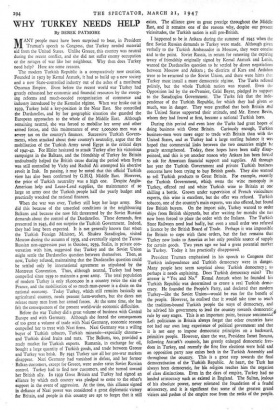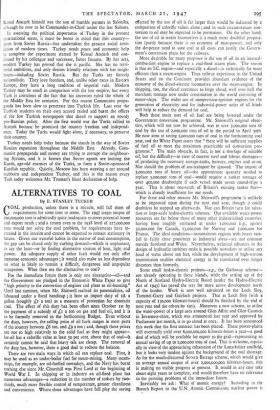WHY TURKEY NEEDS HELP
By DEREK PATMORE
MANY people must have been surprised to hear, in President Truman's speech to Congress, that Turkey needed material aid from the United States. Unlike Greece, this country was neutral during the recent conflict, and she did not suffer enemy occupation or the ravages of war like her neighbour. Why then does Turkey need help? Here are some reasons.
The modern Turkish Republic is a comparatively new creation. Founded in 1923 by Kemal Ataturk, it had to build up a new society and a new State-controlled industry out of the ashes of a moribund Ottoman Empire. Even before the recent world war Turkey had greatly exhausted her economic and financial resources by the sweep- ing reforms and much-needed reorganisation of commerce and industry introduced by the Kemalist regime. When war broke out in 1939, Turkey held a key-position in the Near East. She controlled the Dardanelles, and by her geographic situation she guarded the European approaches to the whole of the Middle East. Although remaining neutral, she was forced to mobilise her army and other armed forces, and this maintenance of over t,000,000 men was a severe tax on the country's finances. Successive Turkish Govern- ments, when attacked about their country's neutrality, argue that the mobilisation of the Turkish Army saved Egypt in the critical days of 1941-42. For Hitler hesitated to attack Turkey after his victorious campaigns in the Balkans, and the friendship of Turkey for Britain undoubtedly helped the British cause during the period when Syria was still controlled by Vichy and Rachid Ali attempted his abortive revolt in Irak. In passing, it may be noted that this official Turkish view has also been confirmed by G.H.Q. Middle East. However, the price of Turkish neutrality was a high one. Despite Anglo- American help and Lease-Lend supplies, the maintenance of so large an army cost the Turkish people half the yearly budget and practically wrecked the national finances.
When the war was over, Turkey still kept her large army. She did this because of the unsettled conditions in the neighbouring Balkans and because she now felt threatened by the Soviet Russian demands about the control of the Dardanelles. These demands, first presented in 1945, did not surprise the Turkish Government. Indeed, they had long' been expected. It is not generally known that when the Turkish Foreign Minister, M. Shukru Saradjoglou, visited Moscow during the autumn of 1939, and eventually signed the Turco- Russian non-aggression pact in October, 1939, Stalin, in private con- versation with him, suggested that Turkey and the Soviet Union might settle the Dardanelles question between themselves. Then, as now, Turkey refused, maintaining that the Dardanelles question could be settled only by international agreement as stipulated by the Montreux Convention. Thus, although neutral, Turkey had been compelled since 1939 to maintain a great army. The total population of modern Turkey is only 18,000,000 in a country twice the size of France, and the mobilisation of so much man-power is a drain on the national economy. Today Turkey, which still remains basically an agricultural country, needs peasant farm-workers, but she dares not release many men from her armed forces. At the same time, she has felt the consequences of the present world-wide economic difficulties.
Before the war Turkey did a great volume of business with Central Europe and with Germany. Although she feared the consequences of too great a volume of trade with Nazi Germany, economic reasons compelled her to treat with Nazi firms. Nazi Germany was a willing buyer of Turkish tobacco, Turkish minerals—especially chrome— and Turkish dried fruits and nuts. The Balkans, too, provided a ready market for Turkish exports. Rumania, in exchange for oil, bought a large quantity of Turkish goods, and trade between Greece and Turkey was brisk. By 1945 Turkey saw all her pre-war markets disappear. Nazi Germany had vanished in defeat, and her former Balkan customers, except for Greece, were under strict Soviet Russian control. Turkey had to find new customers, and she turned toward her British ally. In 1939 Great Britain and Turkey had signed an alliance by which each country was pledged to come to the other's support in the event of aggression. At the time, this alliance signed In defiance of Nazi power was considered a great diplomatic victory for Britain, and people in this country are apt to forget that it still exists. The alliance gave us great prestige throughout the Middle East, and it remains one of the reasons why, despite our present vicissitudes, the Turkish nation is still pro-British.
I happened to be in Ankara during the summer of 1945 when the first Soviet Russian demands to Turkey were made. Although given verbally to the Turkish Ambassador in Moscow, they were concise and to the point. Soviet Russia, in return for renewing the expiring treaty of friendship originally signed by Kemal Ataturk and Lenin,
wanted the Dardanelles question to be settled by direct negotiations between Moscow and Ankara ; the districts of Kars and Ardahan were to be returned to the Soviet Union, and there were hints that Turkey must install a more democratic regime. The Turks refused politely, but the whole Turkish nation was roused. Even the Opposition led by the ex-Prernier, Celal Bayar, pledged its support to the Saradjoglou Government. The Turks felt that the inde- pendence of the Turkish Republic, for which they had given so much, was in danger. They were gratified that both Britain a'nd the United States supported their attitude, and Mr. Ernest Bevin, whom they had feared at first, became a national Turkish hero.
During this period and even later the Turks had great hopes of doing business with Great Britain. Curiously enough, Turkisn business-men were more eager to trade with Britain than with the United States, and as Turkey had a large sterling balance it was hoped that commercial links between the two countries might be greatly strengthened. Today, these hopes have been sadly disap- pointed, and this is yet another reason why Ankara has been forced to ask for American financial support and supplies. All through last year the Turkish Government and private Turkish business concerns have been trying to buy British goods. They also wanted to sell Turkish products to Great Britain. For example, recently the Turkish Government, which owns the wine monopoly in Turkey, offered red and white Turkish wine to Britain at one shilling a bottle. Grown under supervision of French viniculture experts, this wine is excellent, but the offer was refused. Turkish tobacco, one of the country's main exports, was also offered, but found few British buyers. On the import side, Turkey wanted to order ships from British shipyards, but after waiting for months she has now been forced to place the order with the Italians. The Turkish State Railways need lead badly, but even a small order was refused a licence by the British Board of Trade. Perhaps it was impossible for Britain to cope with these orders, but the fact remains that Turkey now looks to America as her only possible source of supply for certain goods. Two years ago we had a great potential market in Turkey. Today it has practically disappeared.
President Truman emphasised in his speech to Congress that Turkish independence and Turkish democracy were in danger. Many people here seem sceptical about Turkish democracy ; so perhaps it needs explaining. Does Turkish democracy exist? The answer is " Yes, and No." Kemal Ataturk when he founded his Turkish Republic was determined to create a real Turkish demo- cracy. He founded the People's Party, and declared that modern Turkey—like the Soviet Union—would be run for the benefit of the people. However, he realised that it would take time to teach the tradition-bound Turkish people the ways of democracy, and he advised his government to lead the country towards democratic rule by easy stages. This is an important point, because sentimental'. Left politicians in Britain always forget that other countries have not had our own long experience of political government and that it is not easy to impose democratic principles on a backward, primitive people. However, since the war, President Ismet Ineunu, following Ataturk's counsels, has greatly enlarged democratic free- dom in Turkey, and recently the first free elections were held and an opposition party now exists both in the Turkish Assembly and throughout the country. This is a great step towards the final democratisation of the Turkish Republic. At heart, the Turk has always been democratic, for his religion teaches him the negation of class distinctions. Even in the days of empire, Turkey had no landed aristocracy such as existed in England. The Sultan, jealous of his absolute power, never tolerated the foundation of a feudal aristocracy, and it is significant that some of the greatest grand viziers and pashas of the empire rose from the ranks of the people.
Kemal Ataturk himself was the son of humble parents in Salonika, although he rose to be Commander-in--Chief under the last Sultans.
In assessing the political importance of Turkey in the present international scene, it must be borne in mind that this country— apart from Soviet Russia—has undertaken the greatest social revo- lution of modern times. Turkey needs peace and economic help to complete the experiment started by Kemal Ataturk and con- tinued by his colleague and successor, Ismet Ineunu. By her acts, modern Turkey has proved that she is pacific. She has no terri- torial ambitions, and only desires friendly relations with her neigh- bours—including Soviet Russia. But the Turks are fiercely nationalistic. They love freedom, and, unlike other races in Eastern Europe, they have a long tradition of imperial rule. Modern Turkey may be small in comparison with the lost empire, but every Turk is conscious of the fact that his ancestors ruled the whole of the Middle East for centuries. For this reason Communist propa- ganda has been slow to penetrate into Turkish life. Last year the Turkish students on their own accord raided and burnt the offices of the few Turkish newspapers that dared to support an openly pro-Russian policy. After the first world war the Turks rallied to Ataturk because he promised the country freedom and independ- ence. Today the Turks would fight alone, if necessary, to preserve their country.
Turkey needs help today because she stands in the way of Soviet Russian expansion throughout the Middle East. Already, Com- munist propaganda and money are trying to corrupt the neighbour- ing Syrians, and it is known that Soviet agents are inciting the Kurds, age-old enemies of the Turks, to form a Soviet-sponsored Kurdish republic. Quietly, Moscow has been weaving a net around stubborn and independent Turkey, and this is the reason every Turk today welcomes Mr. Truman's blunt declaration of help.



































 Previous page
Previous page